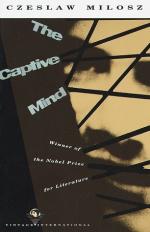|
This section contains 737 words (approx. 3 pages at 300 words per page) |

|
In "The Captive Mind," [Milosz] described members of the Polish intelligentsia who, under the pressure of Communism, had edited themselves into a standard model of hopefulness and brotherhood. Their reasons? Physical fear, to be sure, but also fear that history would leave them behind as mere litter, mere individuals. Today we read "The Captive Mind" as something more than a political document. It is also a parable of the human struggle to become a particular self, to resist overwhelming force, to ignore the honeyed call to solidarity in the name of revolution, church or state….
In America, his "Selected Poems" became available in translation in 1973, and since then his reputation here has slowly grown. It is somewhat daunting to recognize that the greatest poet living in our country writes in Polish. (p. 7)
["The Issa Valley"] is something of an anomaly in Milosz's work: His sober irony is replaced...
|
This section contains 737 words (approx. 3 pages at 300 words per page) |

|


